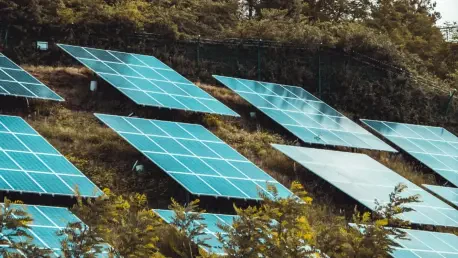In the heart of Puerto Rico, the small mountain town of Adjuntas is emerging as a beacon of hope and innovation in the realm of renewable energy, transforming adversity into opportunity after devastating natural disasters. This community, nestled in rugged terrain, has faced significant challenges due to a fragile electrical grid, worsened by hurricanes that left much of the island in darkness. Yet, through a pioneering initiative led by a local organization, Adjuntas is not only rebuilding but redefining what energy security means for vulnerable regions. The town’s journey offers a compelling glimpse into how grassroots efforts can drive substantial change, providing a model for sustainable living that resonates far beyond its borders. This story of resilience highlights a broader movement toward renewable energy, addressing both immediate needs and long-term environmental goals in a region historically plagued by systemic issues.
Community-Driven Solar Innovation
Building Resilience Through Microgrids
Adjuntas’ transformation began as a response to the catastrophic impact of hurricanes that exposed the fragility of Puerto Rico’s centralized power infrastructure. A local cultural and environmental group, founded decades ago, spearheaded an ambitious project to establish solar microgrids, ensuring energy access for homes and businesses even during crises. Since launching this initiative, five microgrids have been installed, collectively generating significant energy capacity and storage. This decentralized approach empowers the community to maintain essential services, from powering medical equipment to supporting small enterprises, without relying on a vulnerable main grid. The impact is profound, as these systems provide a buffer against outages that once paralyzed daily life, proving that localized solutions can address systemic failures effectively.
Energy as a Human Right
Beyond technical achievements, the solar project in Adjuntas reframes energy access as a fundamental necessity, akin to clean water or shelter. Leaders of the initiative argue that reliable power underpins critical aspects of society, including education, healthcare, and economic stability. By harnessing solar energy, the town reduces dependency on fossil fuels, which not only cuts costs for residents but also mitigates environmental harm. This perspective shifts the narrative from mere survival to thriving, as energy independence allows families to plan for the future without the constant threat of blackouts. Moreover, the storage capabilities of these microgrids ensure stability during peak demand or adverse weather, offering a blueprint for other communities facing similar challenges. The emphasis on equity in access underscores a broader vision where sustainable energy becomes a cornerstone of societal well-being.
Broader Implications for Renewable Energy
A Model for Puerto Rico’s Energy Goals
The success in Adjuntas aligns with Puerto Rico’s ambitious target of achieving 100% renewable energy by 2050, a goal supported by federal funding and innovative projects across the island. This small town serves as a testing ground, often described as a living laboratory where strategies for solar adoption are refined and shared. The microgrid systems demonstrate how scalable solutions can address both rural and urban needs, inspiring other municipalities to explore similar paths. As climate-driven weather events become more frequent, the urgency to transition away from fossil fuels grows, and Adjuntas offers tangible evidence of what’s possible. Knowledge transfer from this project could accelerate the island’s shift to cleaner energy, reducing the atmospheric pollution that exacerbates extreme weather patterns and ensuring a more resilient future for all.
Empowering Global Sustainability Efforts
Looking beyond Puerto Rico, the Adjuntas initiative reflects a growing global trend toward community-led renewable energy projects, particularly in regions prone to natural disasters. The intersection of energy security with societal benefits—such as improved health services and stronger local economies—highlights the multifaceted impact of solar power. This model challenges traditional energy frameworks by prioritizing resilience and equity, encouraging individuals and policymakers alike to rethink infrastructure investments. Tools that connect homeowners with trusted solar installers further democratize access, making adoption more feasible through rebates and cost savings. As environmental concerns mount worldwide, the lessons from this Puerto Rican town underscore the potential for localized efforts to contribute to broader sustainability goals, fostering a collective push against climate change.
Reflecting on a Path Forward
Lessons for Future Generations
Looking back, the strides made in Adjuntas stand as a testament to human ingenuity and determination in the face of overwhelming odds. The establishment of solar microgrids marked a turning point, shifting the community from vulnerability to empowerment after years of grappling with an unreliable power system. This journey illuminated the power of localized action, showing how a small town could tackle monumental challenges through innovation and collaboration. The impact rippled through every facet of life, from ensuring children could study after dark to enabling businesses to operate without interruption. Reflecting on this achievement, it became clear that sustainable energy was not just a technical solution but a catalyst for societal transformation, setting a precedent for what communities could accomplish when united by a common purpose.
Charting the Next Steps
As the story of Adjuntas unfolds, it paves the way for actionable strategies that others can adopt in their pursuit of energy independence. Scaling up similar initiatives requires investment in technology and training to build local expertise in solar infrastructure. Policymakers should consider incentives that lower barriers to adoption, while communities might explore partnerships with environmental organizations to fund projects. Sharing the knowledge gained from this living lab could inspire tailored solutions in diverse regions, addressing unique geographical and economic challenges. Ultimately, the focus must remain on integrating renewable energy with societal needs, ensuring that future efforts prioritize both environmental sustainability and human dignity. This path forward promises not only to mitigate the risks of climate change but also to build stronger, more resilient societies worldwide.









